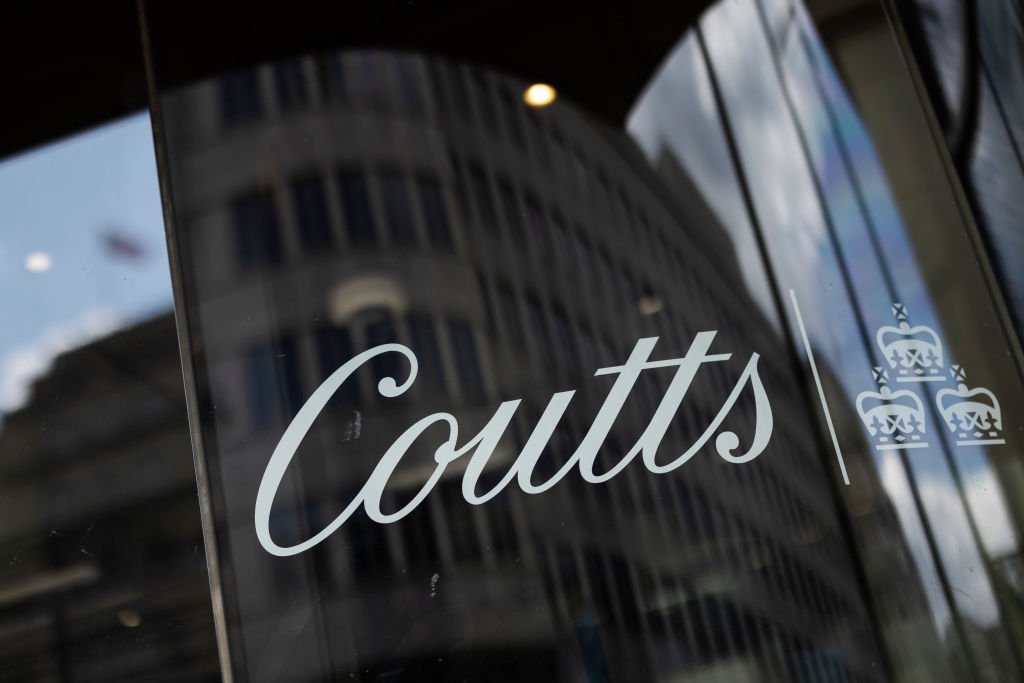Coutts’ Farage decision is a blunder but it’s none of Sunak’s business

There are very few people who want to find themselves in the position of being on the same side as Nigel Farage. Even those who seem to agree with his politics tend to find a way to subtly distance themselves from the hysterical midwife of Brexit. And yet, since Coutts decided to withdraw his bank account on the basis his beliefs were bad for their reputation, even those to the left of Jeremy Corbyn have found themselves tentatively, and perhaps quietly, saying things are not quite right.
To be clear, the question we should be asking ourselves here is not whether Coutts has the ability to withdraw its services based on whether or not they think Farage is a bit of wetwipe, it’s whether it makes good business sense.
On the political side of the equation, there has been quite the festivity of hysteria from Rishi Sunak, Suella Braverman and even David Davis. The former Brexit Secretary suggested the FCA should consider withdrawing Coutts banking licence and Sunak has gone so far as to suggest new regulations to prevent banks from doing this. There was quite the kerfuffle yesterday as some demanded an Urgent Question in Parliament on Nigel Farage’s banking arrangements.
To be quick about it: the government should absolutely not get into the habit of kicking up a stink about the legal decisions of private business, whether or not they agree with them, and it’s relatively amusing to see the lot who normally demand less political intervention and less regulations to suddenly be rather keen on it after all. We also should not be wasting the limited parliamentary time on Nigel Farage. For the love of god, someone just set up a Monzo account for him.
These things may be true, and it is also true that Coutts’ decision is bad for its business.
Coutts became a B corporation in 2021, which essentially means it balances a need to “do good” with its fiduciary duty to shareholders to make a profit. A bit weird for a bank which has made a matzoh off of Russian oligarchs’ mortgages but fundamentally fine and very much of the zeitgeist.
What the Farage decision does is it falls foul of this balancing act: Coutts have prioritised what they think is “doing good” – in this case, not giving its services to someone they deem unacceptable – over the ability to turn a profit.
Coutts should have the ability to decide who it grants its services to. But essential to financial services are really boring things like certainty, predictability and trust. Arbitrary decisions like the Farage one, where the bank initially claimed they were turfing him out on financial grounds, only for it to later emerge they didn’t particularly like his friendship with Novak Djokovic, undermined a commitment to coherence any financial institution should have.
At this point, quite a few people have piped up with the famous case of Ashers, the Christian bakery in Northern Ireland who refused to make a cake supporting gay marriage.
The findings of Farage’s famous friend, European Court of Human Rights did not actually say it was alright for Ashers to discriminate against Gareth Lee on the basis of his sexuality, they said the refusal to supply the cake “was because of the defendants’ religious objection to gay marriage”.
It wasn’t personal, in other words. They would have refused to make the cake supporting gay marriage if it had been requested by the straightest of straight men.
Ben & Jerry’s, for example, refuses to trade in Israel because of its profound beliefs in the rights of Palestine; that is quite different from refusing service to a man wearing a kippah. If, for example, Ashers had refused to make a regular old vanilla cupcake for Gareth Lee, that would have profound discrimination – a decree on the sexual orientation of their customer, regardless of what they were being asked to provide.
You could argue, well Farage was using his money to promote causes Coutts did not agree with and in storing that money, they were enabling him.
What is unclear is the causes Coutts disagrees with. If they had, for example, been a vocal voice in the Remain campaign you could reasonably say they have always been like this and they would refuse service to anyone using their money to promote such a cause. That would have to be a blanket policy applied with some level of discretion. It would be a nightmare to administer and shareholders – in this instance, the shareholders of Natwest, of which the government owns a 38.6 per cent stake – would be within their rights to ask the board what on earth were they doing wasting resources on that. But it would be a clear, company-wide policy.
What instead they appear – and I’d like to stress that point – to have done is target Nigel Farage as an individual, made it about his own personal beliefs and apparently his friendships, without any transparency whatsoever. The incredible irony is that if we were still members of the European Union, you could reasonably argue that the friendship point especially infringed upon his Article 8 Right to respect for his private life, as the claimant in the bakery case attempted to claim.
Under UK laws, legally, there is nothing wrong with this. There is no onus on Coutts to keep him as a customer. That does not mean we should find it acceptable for financial services to act in a way that could charitably be described as random or sceptically described as attention seeking. It also doesn’t mean Parliament should see it as their duty to get involved and start fiddling with the legislation; only if Sunak is a shareholder in Natwest, should he see fit to interfere and only then by selling off his stake.
